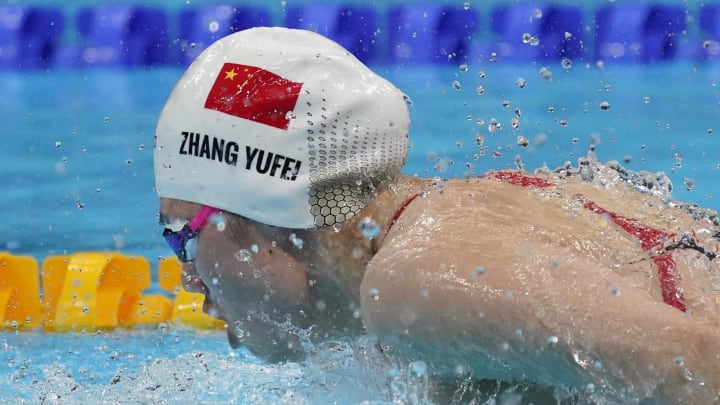WADA Responds to Doping Allegations Involving China Before Tokyo Olympics

The World Anti-Doping Agency (WADA) released a response to questions from The New York Times regarding an investigation into China's swim team in 2016 and '17, which is a separate case from the latest doping allegations involving the Chinese athletes in the most recent Tokyo Olympics.
In April, members of the United States swim team were informed of alleged positive drug tests among the Chinese team that would potentially impact the outcomes of multiple races and medal count in Tokyo, sources told Sports Illustrated's Pat Forde. The New York Times noted that top Chinese female swimmer Zhang Yufei tested positive for a banned substance called trimetazidine, and went on to swim anyway. The drug aids in the metabolization of fatty acids, which helps the body use oxygen and allows for more blood flow to the heart, per WebMD. Yufei captured four medals, including two gold in the Tokyo Olympics.
Male swimmers Shun Wang, who won a gold medal, and Qin Haiyang, also tested positive for the drug.
The positive tests from China's athletes at the 2020 Tokyo Olympics raised questions about the earlier doping case involving Clenbuterol in 2016 and 2017, which WADA says was due to meat contamination. The Agency noted that "trace amounts" of Clenbuterol triggered the positive tests of the athletes and that the contamination threat was highest in China, Mexico, Guatemala and other countries. WADA also noted that three current members of China's swim team were among the athletes that tested positive in 2016 and 2017. The Agency did not note if the athletes who tested positive were Yufei, Wang and Haiyang.
"WADA’s Contaminants Working Group was created for the purpose of providing expert advice and recommendations to the global anti-doping community with regards to prohibited substances that can be prevalent contaminants," WADA said on Thursday. "Over the years, the rules have been adjusted to ensure fairness for athletes who unintentionally ingest a prohibited substance, while protecting the system against those who are cheating. Studies have shown that if you spend much time in China, Mexico and some other countries, your chances of consuming clenbuterol in meat are very high."
Prominent individuals associated with the United States swim team were not thrilled, to say the least, with WADA's assertions.
"It's not great. It's extremely frustrating for the athletes to always have on the back of our mind that maybe the sport is not fair," two-time Olympian Lilly King said. "We put everything on the line—our privacy—everything we do to compete with a level playing field, it's extremely frustrating to not have faith in others to do the same thing."
Cody Miller, a 2016 Olympian, went right after WADA itself.
"It's just really disappointing and frustrating for all the athletes that go through the process of dealing with USADA," he said. "They show up at my house when I'm trying to put my kids to bed and try to feed them dinner, and I have to go stand in the restroom with strangers and pee in a cup. This is commonplace for the United States, which has USADA, an actual anti-doping agency."
USA Swimming CEO Tim Hinchey is hopeful that better days are ahead and a level playing field can be instilled in the Olympics this summer.
"We're always going to steadfastly committed to having a level playing field for our sport. USADA does a great job, they're very strict, they do a great job, our athletes are tested so often. It's disappointing and a distraction again around the Olympics," Hinchey said. "The new folks at World Aquatics, I believe in them and the new integrity unit they put together is an important step. For our athletes right now, it's about making the team. We're going to have a level playing field right here."
The United States will continue to prepare accordingly heading into the Olympics in Paris next month, but plenty of questions around the integrity of swimming remain, especially when it comes to China.
